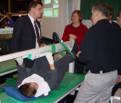The term „apoplectic stroke" (apoplexy, palsy, cerebrovascular apoplexy, vascular cerebral apoplexy, apoplexia cerebri) combines different clinical pictures which share a suddenly occurring functional disorder of the brain caused by either an occluded or burst blood vessel. The first case results in a circulatory disorder of a section of the brain, the second in a blood pool inside or directly next to the brain. In the case of a temporary significant drop in blood pressure, an apoplectic stroke can also happen under the condition of extremely narrowed blood vessels without the occurrence of real vascular occlusion.
The most frequent kind of apoplectic stroke is caused by a cerebral embolism in which a thrombus is transported by the blood stream into one of the arteries leading to the brain or into the brain itself where it causes vascular occlusion. Such blood clots often originate in the heart or the carotid artery.
A different kind of apoplectic stroke is caused by a cerebral thrombosis, which occurs when a local thrombus builds in a vessel of the brain. Blood clots develop in arteries damaged by arteriolosclerosis, a disorder in which thick, irregular cholesterol deposits form on the artery wall. But apoplectic strokes can also be triggered by inflammations, vascular spasms, migraine or tumors.
The sanguineous apoplectic stroke is a result of a burst blood vessel in the brain (a so-called intra-cranial haematoma or intra-cerebral hemorrhage). It is caused by a bleeding due to a tear in a damaged artery, which floods the surrounding cerebral tissue with blood. Intra-cerebral hemorrhages often occur in connection with high blood pressure. If, however, a vessel bursts in the region between the brain and the skull, we speak of a so-called subarachnoid hemorrhage. Finally, also a blood-outlet disorder can dramatically impair the circulation and thus the supply of the brain. The clinical symptoms, the course of the illness as well as possible complications always differ greatly from case to case.
Last update: October 28, 2007
Los Angeles,
California
Los Angeles,
California
Los Angeles,
California
Orlando,
Florida
Phoenix,
Arizona
San Francisco,
California
New York
Atlanta, Giorgia
Home Page Causes Injury complications








